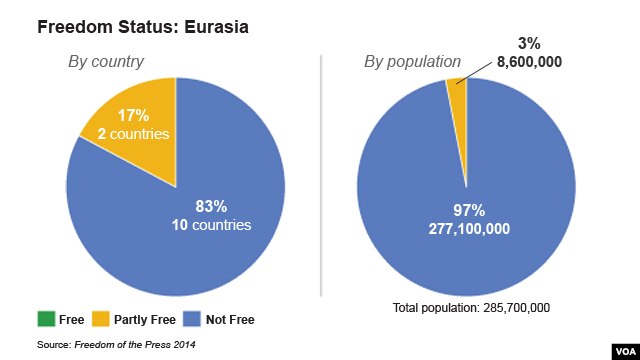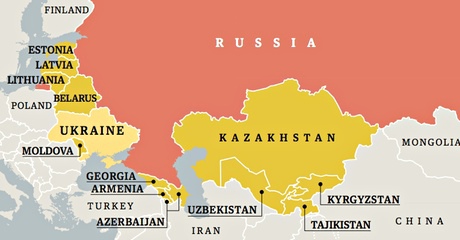When the Malaysia Airlines plane crashed in eastern Ukraine last week, the Russian state media began to spread obvious disinformation and anti-Ukraine propaganda. With fabricated witnesses and unlikely hypotheses, consumers of Russian media received a disturbingly false picture of this international crisis.
This message reaches beyond Russia’s borders to the former Soviet republics, where Russia still plays a large role. Russia uses the media to achieve its foreign policy goals by manipulating public opinion on Russia and international events. Its use of media to increase its soft power in the region has led to detrimental effects on the media environment in the region.
The Russian government values the power its media empire supplies when designing its foreign policy; in fact, its 2013 Foreign Policy Concept includes a section titled “Information Support for Foreign Policy Activities” which specifies the role media will play:
“In its public diplomacy, Russia will seek to ensure its objective perception in the world, develop its own effective means of information influence on public opinion abroad, strengthen the role of Russian mass media in the international information environment providing them with essential state support…”
Russian state-controlled news networks produce more professional, attractive news coverage than the domestic media outlets in several neighboring countries. As a result, the foreign audience trusts the content despite its biases. Russian networks emphasize their mission to present the Russian view on events, which often involves disinformation and propaganda. Russian media is especially powerful in Central Asia, where Russia’s close allies reside and where press freedom has steadily declined. Russia also tries to influence the Baltic states, exposing the Russian-speaking population to ideas it otherwise would not have heard. For instance, some Russian papers in Latvia express open hostility to the Latvian government.
Economically and politically, Russia is a powerful state that sets the standard for its neighbors. Through the media, Putin is able to spread his ideals of “sovereign democracy”, where each nation determines its own definition of democracy as an alternative to Western democratic principles, thereby undermining democratic developments in these nations. For example, Kazakhstan has taken Putin’s cue to implement similar plans to restrict the media environment and pursue an authoritarian path. This region is particularly challenging for media development, where Moldova and Georgia are the only states considered to have “partly free” media environments, according to Freedom House.

Press Freedom Status in Eurasia, according to Freedom House
It is important that independent news sources be supported in Russia and the former Soviet republics to prevent the deterioration of the media environment and ensure access to information in this area of the world. There needs to be a concerted effort to provide objective Russian-language news in this region.
For more about Russian media’s influence on its neighbors, read David Satter’s report for CIMA, “The Last Gasp of Empire: Russia’s Attempts to Control the Media in the Former Soviet Republics”. You can read about Chinese media’s similar efforts in “CCTV’s International Expansion: China’s Grand Strategy for Media” by Anne Nelson.


Comments (0)